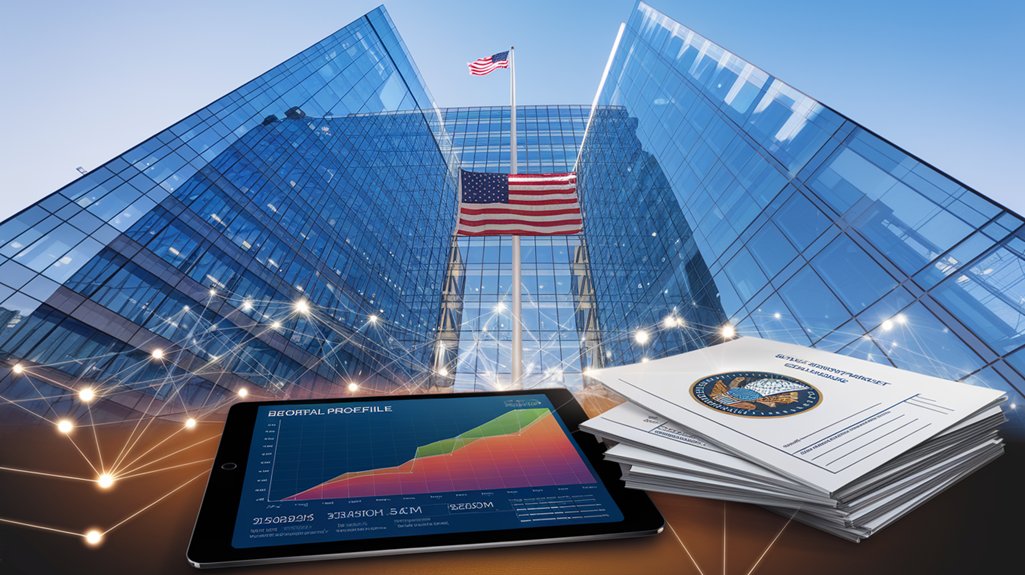Federal contractors can maximize their SAM profile’s appeal by strategically optimizing company descriptions with industry-specific keywords and relevant NAICS codes. Showcasing past performance with quantifiable metrics, displaying certifications, and uploading supporting documentation greatly increases visibility to procurement officers. Regular profile updates that align with federal priorities demonstrate engagement and reliability. Consistent information across platforms builds credibility while strategic networking through SAM.gov connections opens pathways to valuable contract opportunities.
Optimize Your Company Description and Keywords for Maximum Visibility

Crafting a strategic company description stands as the cornerstone of an effective SAM profile, serving as the primary tool for communicating value to federal agencies. This description must clearly articulate company values and unique offerings while maintaining a professional tone that resonates with federal contracting officers.
Businesses should incorporate industry-specific terminology and relevant keywords throughout their profiles without overusing them. Strategic placement of these terms enhances searchability while demonstrating expertise. Selecting the correct NAICS codes aligned with your business capabilities is crucial for being matched with appropriate contract opportunities. Consistent information alignment between SAM and DSBS profiles is essential for building credibility with contracting officers reviewing your business.
Organizations must regularly update their descriptions to reflect evolving capabilities and align with current federal priorities. Federal grant opportunities become more accessible when profiles are properly maintained and detailed. The most effective profiles balance thorough information with concise language, focusing on core competencies that address specific government needs. Companies should review their descriptions quarterly, ensuring the content remains dynamic and accurately represents their current solutions and competitive advantages.
Showcase Past Performance and Certifications That Appeal to Federal Buyers

While optimizing your company description establishes your brand identity, substantiating your capabilities through documented evidence creates a compelling case for federal buyers. Federal agencies heavily rely on past performance evaluations when awarding contracts, making CPARS ratings essential for competitive positioning.
Your SAM profile should highlight successful federal contracts with quantifiable metrics, such as on-time delivery percentages and cost savings. Upload supporting documentation, including award letters and performance reviews, to validate your claims.
Additionally, prominently display relevant certifications like 8(a), HUBZone, or industry-specific credentials (ISO, CMMI, FedRAMP). These certifications signal compliance readiness and may qualify your business for set-aside contracts worth billions annually.
Organize information chronologically or by contract value, using consistent formatting that allows government buyers to quickly assess your capabilities and track record.
Starting with obtaining a DUNS number is crucial for establishing your business’s unique identity in the federal marketplace and initiating the SAM registration process.
Strategic Networking and Engagement Through Your SAM Registration

Beyond mere registration compliance, your SAM profile serves as a powerful networking tool that connects your business to the vast federal marketplace. Government agencies actively search SAM.gov to identify qualified contractors for upcoming projects, making your profile visibility essential for capturing federal opportunities.
Effective networking strategies include maintaining accurate NAICS codes that precisely match your business capabilities, regularly updating company information, and leveraging small business certifications. Federal financial assistance opportunities become more accessible when your registration is properly maintained.
Consider joining the GSA Schedules program to expand your contracting access across multiple agencies.
Strategic engagement also involves using SAM.gov for market research—analyzing competitor profiles, identifying potential partners, and tracking industry trends. This intelligence helps position your business strategically and builds relationships with federal procurement officers who rely on SAM data for vendor selection.
Recent case law developments have created significant uncertainty, so monitoring your registration status to prevent lapses has become increasingly critical for eligibility in federal contract competitions.
Frequently Asked Questions
How Long Does a SAM Registration Take to Become Active?
The SAM registration timeline typically ranges from 2 to 8 weeks before becoming active. This process includes submitting business information, providing a notarized letter for the Entity Administrator, and undergoing SAM’s internal review procedures.
Registration processing delays may occur due to incomplete documentation, high application volumes, information errors, or technical issues. After verification, activation usually happens within a few business days.
Processing times vary based on business complexity and the accuracy of submitted materials.
Can I Update My SAM Profile After Initial Registration?
Yes, businesses can update their SAM profile after initial registration.
The SAM registration system allows for modifications through the “Manage Entity” section after logging into SAM.gov. Users can revise core data, points of contact, and other business information as needed.
SAM profile updates may trigger verification processes that take 10-12 business days to complete.
Regular updates are essential for maintaining eligibility for federal opportunities and ensuring compliance with government requirements.
Is SAM Registration Required for State and Local Government Contracts?
SAM registration is not required for state contracts or local contracts, as these are governed by their own specific requirements.
State and local government agencies typically maintain separate registration systems for vendors seeking to do business with them.
While SAM registration may provide credibility advantages, businesses interested in state or local government opportunities should check with each specific agency about their registration processes and vendor requirements.
What Happens if My SAM Registration Expires During a Contract?
When a SAM registration expires during an active contract, the contractor faces significant disruptions to ongoing operations.
Contract delays become inevitable as the company loses eligibility to receive federal payments. Federal agencies may suspend work until registration renewal is completed, potentially causing financial hardship.
The contractor cannot legally perform work under the expired registration, risking contract termination.
To avoid these consequences, organizations should implement proactive renewal procedures well before expiration dates.
Are There Size Limitations for Businesses Registering in SAM?
Yes, there are size limitations for businesses registering in SAM, but these don’t restrict registration itself.
Size requirements are based on SBA standards that vary by industry using NAICS codes. Businesses must accurately report their size metrics (employee count or annual receipts) to determine their business classifications as small or large.
This classification affects eligibility for small business set-aside contracts, but all businesses, regardless of size, can register in SAM to pursue federal contracting opportunities.